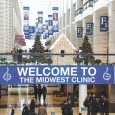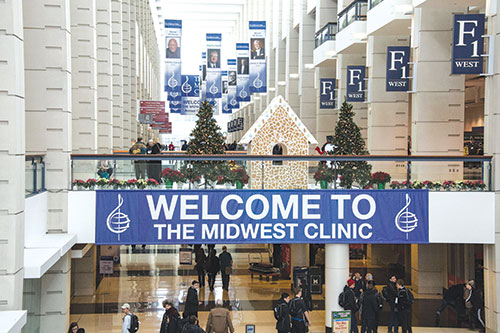
As the Midwest celebrates 75 years, we asked a distinguished group of educators to share their favorite memories of attending the Midwest Clinic.
Paula A. Crider
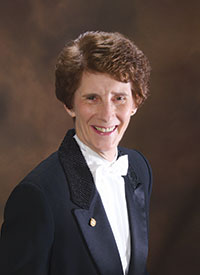 The first time I ever attended Midwest, I was a wide-eyed university sophomore, totally in awe of all of the sights and sounds offered at this great convention. While riding on a crowded Hilton elevator, I glanced at a name tag which read “Clare Grundman.” Until that moment, I believed Clare Grundman was a female composer, and the only “female” composer whose music I had performed in high school.
The first time I ever attended Midwest, I was a wide-eyed university sophomore, totally in awe of all of the sights and sounds offered at this great convention. While riding on a crowded Hilton elevator, I glanced at a name tag which read “Clare Grundman.” Until that moment, I believed Clare Grundman was a female composer, and the only “female” composer whose music I had performed in high school.
I still chuckle at my naivete (and more than a little disappointment), but thus began my journey of life-long enlightenment at The Midwest Clinic!
(Side note: The Midwest Clinic is now aggressively encouraging the performance of music by female composers.)
Paula Crider has successfully taught at all levels. She is Professor Emerita at the University of Texas, Senior Educational Consultant for Conn-Selmer, Inc. and serves on the Midwest Board.
* * *
Becky Rodgers Warren
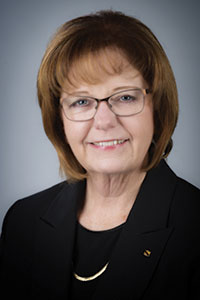 I began attending the Midwest in the 1980s, early in my career. My college band director, Edd Jones, had been a staff member who took the Elmore County Band from Wetumpka, Alabama to the Midwest in 1965. That photo hung behind his desk and became a symbol of where the best bands are asked to perform. My Midwest experiences helped to shape my career and my life.
I began attending the Midwest in the 1980s, early in my career. My college band director, Edd Jones, had been a staff member who took the Elmore County Band from Wetumpka, Alabama to the Midwest in 1965. That photo hung behind his desk and became a symbol of where the best bands are asked to perform. My Midwest experiences helped to shape my career and my life.
Highlights of my Midwest memories range from sitting next to Elizabeth A.H. Green at my very first concert in the Grand Ballroom to seeing our very own Mandan Band serve as a clinic group for Tom O’Neill decades later. Upon presenting my first Midwest clinic in 2009, my nerves were calmed when I realized that the room was filled with like-minded people who wanted to learn and see me succeed. Having the opportunity to once again present with my friend Lori Hart in 2016 brought two Alabama gals back together.
Time in the exhibits was always time well spent. Only at the Midwest exhibits could I hear Clare Grundman, with a great chuckle, tell my very tired friend Vanessa, “Miss, you must keep your shoes on in our booth.” Connections became friendships. Questions got answers. Through the Midwest attendees became better at their craft of teaching music. All of that happened for me, and my dreams became reality.
In 2004, after a very long day of concerts, clinics, and exhibits, I ventured over to George’s behind the Hilton (if you know, you know) and met the Alabama crew. While there my friend Steve McLendon suggested I meet these two guys from North Dakota. One owned music stores, and the other was a high school band director. After a beverage or two, as well as a long discussion of European marches, the band director asked if I would like to go to Water Tower Place for a bit of Christmas shopping on Saturday after the final Midwest Concert. He did not realize that was my annual tradition anyway.
Fast forward to the 2008 Midwest where John and I attended for the first time as husband and wife. Two “confirmed single people” shared the love of being band directors, the love of attending Midwest, and the love of each other. In 2021 we will attend the Midwest, reminisce about George’s, and shop at Water Tower Place. He will be my biggest supporter as I present a clinic, and I will once again feel the love and support of so many old, new, and soon to be friends. Though we are both retired as full-time band directors we still are “in the business.” We still have so much to learn! So, we’ve already begun letting friends know, “We will see you at The Midwest and meet you at The Tree.”
Becky Rodgers Warren served as a band director for 40 years. She continues to stay active as an adjudicator, guest conductor, clinician, and professional development speaker. She resides in North Dakota with John and their Golden Retriever, Bama.
* * *
Tom Lizotte
.jpg) I have attended all but three Midwest Clinics since 1988, so the memories are legion. Here are three of my favorites, all involving Frederick Fennell.
I have attended all but three Midwest Clinics since 1988, so the memories are legion. Here are three of my favorites, all involving Frederick Fennell.
• Heading up the escalator of the Palmer House and hearing a rumble above. Arriving in the lobby to find a sea of tubas and Mr. Fennell high on a podium, dressed in a Santa suit and conducting TubaChristmas.
• Rushing in late from dinner for a Fennell concert at the Hilton, breathless and hoping to have not missed the downbeat. Looking in the bar, only to see Mr. Fennell by himself quietly having a beverage. A few minutes later he strides in and conducts a great concert. Few are aware of the cause of the delay.
• My favorite: a morning with Frederick Fennell at the Hilton. This was one of his last Midwests. He sat in a chair on stage and discussed his life from the 1920s until the founding of the Eastman Wind Ensemble. An hour and a half without a note and without a misstep. Such an amazing display of mental acuity! An irreplaceable figure in our midst.
Tom Lizotte taught for 31 years, including 17 as director of bands at Cape Elizabeth High School in Maine.
* * *
Arris Golden
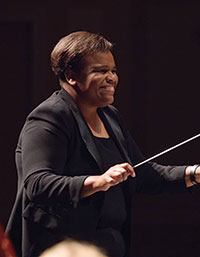 At my first Midwest in 1996, I remember being enthralled by actually seeing, in person, all of the composers and conductors that I had spent so much time watching in performance or performing their music myself. If memory serves me correctly, it was also an anniversary year for the Midwest Clinic, so there were so many great bands there. Hearing (I think), Longfellow MS, from Virginia, Winter Park HS from Florida, Lassiter HS from Georgia, and many Texas bands opened my ears to a whole new set of possibilities as a young musician and teacher. I admittedly spent years unpacking all the sounds and heard and finding some of those directors to pick their brains about how they do what they do.
At my first Midwest in 1996, I remember being enthralled by actually seeing, in person, all of the composers and conductors that I had spent so much time watching in performance or performing their music myself. If memory serves me correctly, it was also an anniversary year for the Midwest Clinic, so there were so many great bands there. Hearing (I think), Longfellow MS, from Virginia, Winter Park HS from Florida, Lassiter HS from Georgia, and many Texas bands opened my ears to a whole new set of possibilities as a young musician and teacher. I admittedly spent years unpacking all the sounds and heard and finding some of those directors to pick their brains about how they do what they do.
I cannot remember the year for this one, but having the opportunity to sit in on a clinic presentation by Cheryl Floyd was another inspiring and career-altering event. In a 45-minute clinic session, she absolutely changed the sound of the ensemble and modeled so many “teacher behaviors” that I took back to my teaching situation in North Carolina, all of which made an immediate difference for both my students and me. It was really both eye-opening and stunning to watch. It is a session that I still talk about today with my colleagues and friends in the profession, and I try to share with them every single thing I learned from that experience.
Arris Golden is the Assistant Director of Bands and Associate Director of the Spartan Marching Band at Michigan State University. She previously taught at the University of North Carolina at Chapel Hill. Before moving to the collegiate level she taught for 18 years in the public schools of North Carolina.
* * *
Frank Battisti
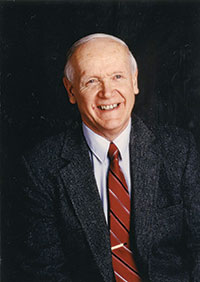 My most meaningful Midwest Clinic memory concerns the content of the concert performed by my Ithaca (NY) High School Concert Band on December 16, 1965. It consisted mostly of pieces that were outside the prescribed regulations band directors had to adhere to when selecting pieces for their Clinic concert. For example: pieces selected had to be published within the year and could be no longer than 6½ minutes in length. Directors of the bands selected to perform at the Midwest Clinic were sent copies of newly published pieces from which they were to select those they wished to include on their concert. It soon became apparent to me that there was no possible way I could select a program, from the music sent to me, that would represent what we did at Ithaca High School. I believed that our Midwest concert program needed to reflect what we did in the band program in Ithaca. Therefore, I submitted such a program to the Midwest Clinic concert/program committee, hoping they would approve it. After some rather lengthy discussions, the program (below) was approved.
My most meaningful Midwest Clinic memory concerns the content of the concert performed by my Ithaca (NY) High School Concert Band on December 16, 1965. It consisted mostly of pieces that were outside the prescribed regulations band directors had to adhere to when selecting pieces for their Clinic concert. For example: pieces selected had to be published within the year and could be no longer than 6½ minutes in length. Directors of the bands selected to perform at the Midwest Clinic were sent copies of newly published pieces from which they were to select those they wished to include on their concert. It soon became apparent to me that there was no possible way I could select a program, from the music sent to me, that would represent what we did at Ithaca High School. I believed that our Midwest concert program needed to reflect what we did in the band program in Ithaca. Therefore, I submitted such a program to the Midwest Clinic concert/program committee, hoping they would approve it. After some rather lengthy discussions, the program (below) was approved.
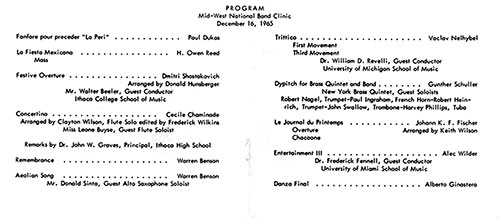
All the works on this program were very challenging – very different in style and content than those included on programs performed by the other Clinic bands. Four were written by composers whose music at the time was seldom (if ever) performed by bands (Benson, Schuller. Wilder, Ginastera); two were for small woodwind/brass ensembles (Dukas, Fischer) and four were longer than 6½ minutes (Wilder, Schuller, Benson, Nelhybel). Even though the pieces were not the usual “band fare,” the audience’s response at the concert was very enthusiastic. At the end of the program the band received a lengthy, sustained standing ovation. Donald McCathren, Band Director at Duquesne University, was so excited and thrilled by the performance that he immediately rushed back stage and invited the band to perform at the 1967 Mid-East Instrumental Music Conference in Pittsburgh, PA. A few band directors, however, did think the program was not “really band music”.
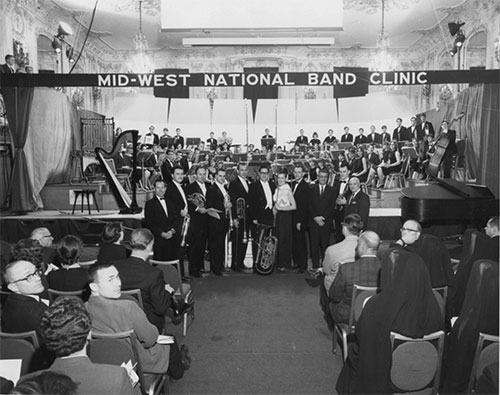
Prior to the start of the concert, band members, guest conductors and soloists posed for a photograph. Standing in front of the band are (left to right), Dr. Frederick Fennell, Robert Heinrich, Paul Ingraham, Robert Nagel, John Swallow, Harvey Phillips (members of the New York Brass Quintet), Leone Buyse, Frank Battisti, Walter Beeler, Donald Sinta and Dr. William D. Revelli.
Frank L. Battisti is Conductor Emeritus of the New England Conservatory Wind Ensemble, which he founded and conducted from 1969-99. He is the founder of the World Association of Symphonic Bands and Ensembles and author of nine books. During his career he commissioned and premiered over 60 works for wind ensemble by distinguished American and international composers including Warren Benson, Leslie Bassett, John Harbison, Witold Lutoslawski, Vincent Persichetti, Michael Colgrass, Gunther Schuller, Sir Michael Tippett, Robert Ward, and Alec Wilder. Battisti was a visiting fellow at Clare Hall, Cambridge University (UK) in 1986 and 1992 and has been awarded three Honorary Doctorates from Ithaca College, Rhode Island College and the New England Conservatory of Music.
* * *
Charles Menghini
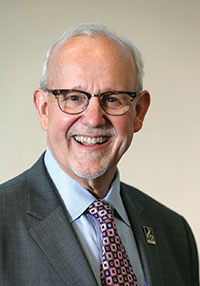 I was at VanderCook for 23 years and conducted 22 concerts – the only one I missed was the year I had a heart attack and bypass surgery. Of those years, my favorite Midwest memories were always when I was able to make a connection between a conductor or soloist and the band and hopefully the audience. My favorite of all the favorites happened in 2012 when I invited George Quinlan, Sr. to conduct the band. Mr. Quinlan was widely known in the Chicago area for his music company, Quinlan and Fabish Music, but he also was a school band director in his early years in the Catholic School system and I know he was a big part of the early years of the Midwest Clinic too.
I was at VanderCook for 23 years and conducted 22 concerts – the only one I missed was the year I had a heart attack and bypass surgery. Of those years, my favorite Midwest memories were always when I was able to make a connection between a conductor or soloist and the band and hopefully the audience. My favorite of all the favorites happened in 2012 when I invited George Quinlan, Sr. to conduct the band. Mr. Quinlan was widely known in the Chicago area for his music company, Quinlan and Fabish Music, but he also was a school band director in his early years in the Catholic School system and I know he was a big part of the early years of the Midwest Clinic too.
In 2012, Mr. Quinlan’s grandson, Andrew was a student at VanderCook and a percussionist in the band, and I asked Mr. Quinlan to conduct. A week or so before the concert, he fell ill and required hospitalization. With his condition, I thought he might not be able to fulfill his commitment. But the day before the concert, he checked himself out of the hospital, and in a wheelchair proceeded to conduct the band. He later told me, “I told you I would conduct the band and there was no way I was going to miss it!”
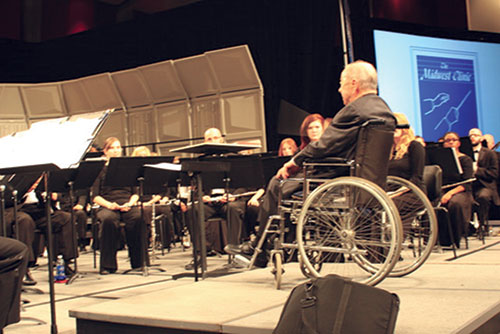
So at our 2012 Friday concert, Mr. George A. Quinlan, Sr. conducted the VanderCook Band in John Philip Sousa’s The Thunderer March. This remains my favorite Midwest memory.
Charles Menghini is President Emeritus of VanderCook College of Music. He served as President and Director of Bands from 2004-2017. He also taught successful high school band programs in Missouri and Kansas. He is the host of the Band Talk podcast.
* * *
Scott Casagrande
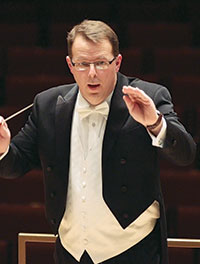 I have never missed a Midwest Clinic (including last year) beginning in 1987 when I was a college student. My dad (also a band director and music education professor) was very excited to introduce me to the event, and I recall going with him to buy my first suit in preparation. He had a great saying that he used to share with his Music Education majors that I loved: “You’ll learn more in the Hilton Lakeside Green at the Midwest Clinic than any college class you’ll ever take.” My story relates to that.
I have never missed a Midwest Clinic (including last year) beginning in 1987 when I was a college student. My dad (also a band director and music education professor) was very excited to introduce me to the event, and I recall going with him to buy my first suit in preparation. He had a great saying that he used to share with his Music Education majors that I loved: “You’ll learn more in the Hilton Lakeside Green at the Midwest Clinic than any college class you’ll ever take.” My story relates to that.
In 2008, our John Hersey High School band played Frank Ticheli’s Symphony #2 for Band. I saw Mr. Ticheli in the Hilton Lakeside Green Lounge and approached him about the piece. It was surreal talking with him about the interpretation of this fantastic work in that stuffed room, shoulder-to-shoulder, talking over all the noise, shouting and yelling. He thoroughly engaged with me about his work (Movement II, particularly) and we spent about 15 minutes talking, although the discussion seemed to last about 2 seconds.
We performed the work at our state event a few months later and won “honor band” designation for the first time, but most importantly, the musical decisions that we made thanks to that chance visit led to one of the most musically inspiring moments in my career a few months later. This is one of the great aspects of the Midwest Clinic: a professionally life-changing moment could happen in any hallway, clinic, restaurant or bar. But you have to go to have that experience!
Scott J. Casagrande was Director of Bands at John Hersey High School in Arlington Heights, Illinois for 22 years and retired in June 2021 after completing 33 years of teaching in Illinois public schools. He taught high school, middle school and elementary students in suburban, urban and rural settings over the course of his teaching career.
* * *
Tom Trimborn
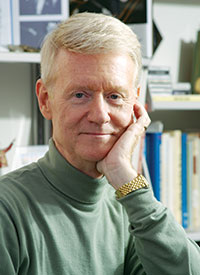 A Midwest Chain of Events
A Midwest Chain of Events
Back when the nation’s bicentennial was approaching, my keen interest in the music of John Philip Sousa led me to propose doing a Sousa concert made up entirely of his unknown works. After a fruitless search for some of that music, I turned to the Library of Congress for help. It was suggested that I contact a man by the name of Robert Hoe, a former ‘youffer’ who had an extensive private collection of Sousa music. Through letters and phone calls we decided to connect at the upcoming Midwest Convention in Chicago. A time and general location were set to meet in the hotel lobby. After a firm handshake we adjourned to the hotel coffee shop where I told him about my high school band program in nearby Palatine, Illinois and the music I hoped to program.
During our conversation he promised to send me the music I wanted, and within a week, a large box arrived with every score and part I had hoped to find – suites, novelties, little known marches – the works. And it was all completely free of charge. The concert was a huge success on every possible level.
Over the course of many years, Mr. Hoe sent me a complete set of LP Heritage of the March recordings plus many more singles which he produced and funded – the music not only of Sousa but a host of others played by the Marine Band and other prestigious ensembles. Later, in the process of delivering my very first article to appear in The Instrumentalist (August, 1975) that described my Sousa concert, I had the pleasure of meeting the founding publisher Traugott Rohner, and later still to meet and spend an afternoon with the legendary Sousa biographer Paul Bierley who had read it and written me a wonderful letter which I treasure to this day. All of this began with a meeting at Midwest. Who could have imagined such a wonderful chain of events? A chain that in my case continues to this day.
Vivid Midwest Memories
Several other of my vivid Midwest memories include meeting and talking with composer Alfred Reed about his Alleluia Laudamus Te, seeing Col. John Bourgeois’ eyes light up as he was telling me about his miniature Sousa Band figures made at the Le Petit Soldier Shop in New Orleans, hearing a particularly jaw dropping performance by the U of I Band conducted by Harry Begian, and suddenly seeing a large photograph of Claude T. Smith framed in black on the display floor that stopped me in my tracks. It announced his sudden passing just days earlier.
Thomas Trimborn retired from Truman State University as Professor Emeritus of Music having spent 16 of his early 45-year career in suburban Chicago at Palatine High School as Director of Bands.
Share Your Midwest Memories
We would love to hear about your most memorable Midwest moments from clinics and performances to the interesting people you have met there. Send your stories to us at editor@theinstrumentalist.com.
